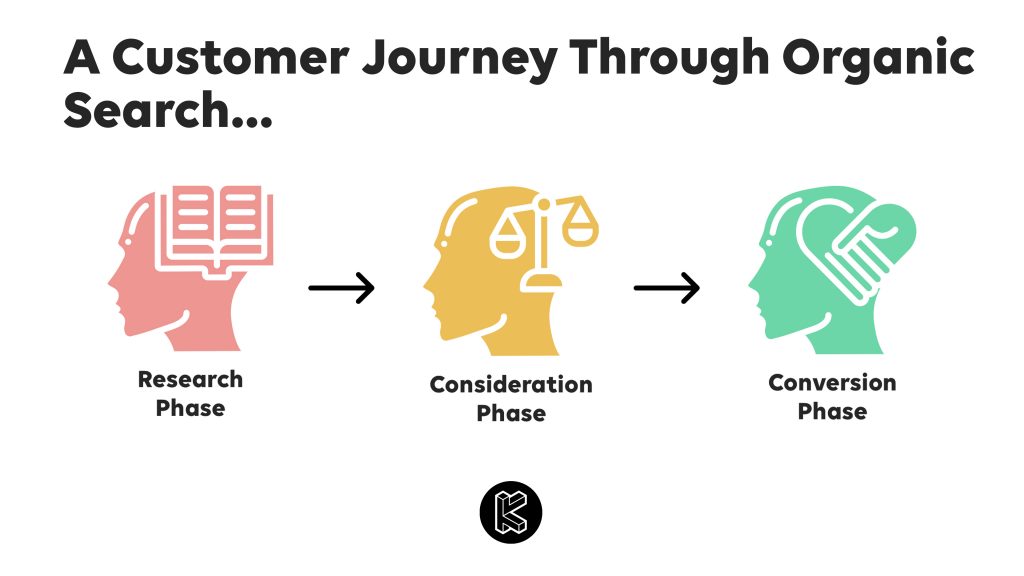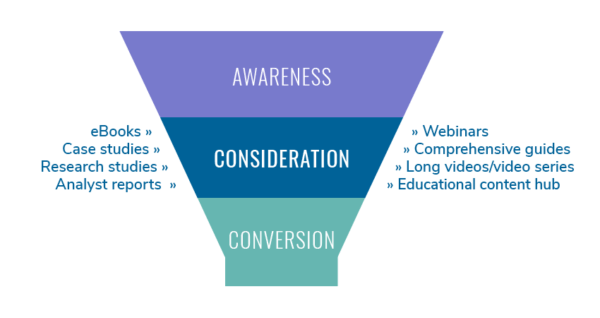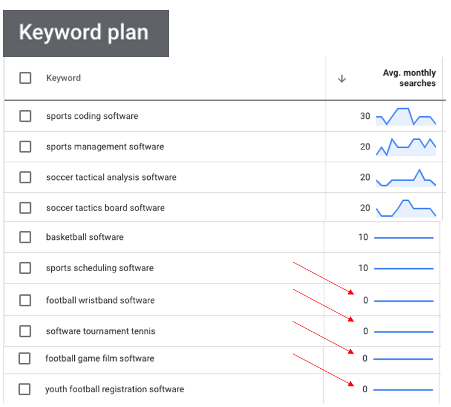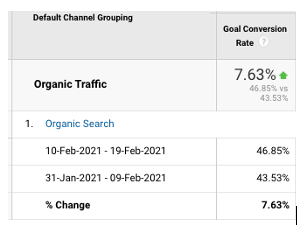Why SEO matters in 2021 & why you think it doesn't
We’ve been asking some big questions, like is SEO worth it? and how does Google rank websites? but this addresses another huge query. These are reasons why SEO matters.

We’ll look at some big reasons as to why search engine optimisation shouldn’t be cast aside.
Why SEO matters?
- It shows you real data, not hunches
- It gets you more conversions
- It builds a long term audience
- It’s the most cost effective form of marketing
- It helps you show up in Google’s rankings
- It’s natural advertising, not pushy
- It helps businesses that don’t even have a website yet
- It affects your audience buyer’s journey
- SEO enhances your brand’s credibility
- Organic traffic is one of the biggest sources of traffic
Let’s dig in.
1. It shows you real data, not hunches
A logical search engine optimisation campaign will use Google Analytics to track everything. That means the SEO strategy is then fuelled using the tracking the real behaviours of people who land on a website. From the most commonly used pages to the bounce rates and conversion rates, data is reliable. It’s not based on a guesstimate, a rough take, an idea or a hunch. If you’re using SEO, you can pinpoint exactly where your natural sessions are coming from, and how many are converting. Only then can you logically decide where your focus should be to get more traffic.
2. It gets you more conversions
If your current traffic is converting (even if the conversion rate is low), using search engine optimisation to get more traffic will naturally mean you get more conversions. If your traffic isn’t converting, it’s worth looking at why – this is where conversion rate optimisation can help.
Did you know that, as of 2019, according to Smart Bug Media…
“SEO leads have a 14.6% conversion rate, while outbound leads (such as direct mail or print advertising) have a 1.7% conversion rate”?
3. It builds a long term audience
You might already know that PPC is much more likely to get you quicker results. It’s successful in that sense, don’t get us wrong. But a huge benefit as to why organic search matters, is that optimising your website isn’t just about appearing for keywords. SEO takes time, and that makes it an investment, that pays off when it’s done right.
Over the time you’re working on your SEO, Google will notice you fixing technical problems, and making content changes. When you fix things, Google theoretically rewards this. So, not only will you start to successfully rank for your target keywords, but your brand name starts appearing, and keeps appearing, to your audience.
In other words, SEO helps boost your brand awareness. If people keep seeing your brand name in the listings, they might outright search for your brand name and click your URL, select one of your organic listings, or type in your website domain into Google. The result? All your site traffic.
4. It’s the most cost effective form of marketing
Other forms of marketing can mean you’re paying to appear, drive traffic and generate leads. But with SEO, the cost is paying for the time invested by experienced specialists in the industry, the resource and data they have and the tools they’ll utilise effectively and regularly. That’s what will really make an SEO campaign work successfully.
That’s why in the long run, it’s more cost effective than having to pay every day to have your brand or website domain appear in an advertising or pay per click spaces.
5. It helps you show up in Google’s rankings
When SEO is done correctly, you can start being listed by Google in the SERPs. And when you appear as a listing, you’ll get what’s called a ‘click through rate’ (CTR). This means the number of people who see your listing, compared to how many of those actually click your link. If you rank on page 1, the CTR shifts up to be more noticeable than page 2.
Here are the average CTRs for page 1 listings, as of 2020:
| Rank | CTR |
| 1 | 34.20% |
| 2 | 17.10% |
| 3 | 11.40% |
| 4 | 8.10% |
| 5 | 7.40% |
| 6 | 5.10% |
| 7 | 4.10% |
| 8 | 3.30% |
| 9 | 2.90% |
| 10 | 2.60% |
If your keyword has a monthly search volume of, let’s say, 8000. Then, let’s say, before you start any SEO work, you rank way down past the third or fourth pages of Google’s listings. You carry out the right optimisation, and reach position 4. This gives you a total monthly number of organic sessions of 648 (if the search volume and position stays the same). Depending on what your conversion rate is, those are extra natural conversions your business wouldn’t have had without SEO.
6. It’s natural advertising, not pushy
The Drum talks about a study from 2020 that asked 8k people across the UK, China and US their opinions about marketing. A whopping 70% of people in the UK answered that they “don’t trust” information on social platforms from brands. This tells us it’s quite clear people don’t like pushy advertising. That is exactly why SEO helps, because it’s not shoving a pamphlet in someone’s face in the street. It’s naturally appearing in a list of answers – for something that someone is already looking for.
7. It helps business that don’t even have a website yet
A lot of people think of SEO that only works if you’ve got a website. But the concept goes a step further. Search engines have a clever piece of magic means that they can pull data to show up for different businesses. So, if you don’t have a domain, Google can still show your Google My Business profile (if you have one) to users who search for you.
That means you might benefit from the search (because someone will see your business contact details and Google Maps will show your location), without you having a website. On top of that, if you have reviews on other websites, Google might pull these up too.
That’s just how advanced Google is. So, imagine if you had a tip-top website on top of that.. Imagine the potential to be found then.
8. It affects your audience’s buyer journey
You’re probably already familiar with the marketing journey, or marketing funnel*. Well, SEO has the potential to cover all parts of the marketing funnel. Here is how organic search specialists use SEO at each stage of the consumer journey:
- TOFU (Top of Funnel) = awareness, so create social media posts, videos and helpful blog posts
- MOFU (Middle of Funnel) = consideration, so produce educational demos, case studies and ‘how to’ pieces
- BOFU (Bottom of Funnel) = conversion, so build a portfolio of persuasive pieces like testimonials and reviews
Having a website is one thing. But without best practice organic search, you won’t be able to create any of the content above that’s successfully optimised, ranks and gets seen, to feed into the user’s journey. Only then will you get sales, which is why SEO is important to get potential customers.
*If not – the marketing funnel is a 3 stage process with the third part being where your user converts into a customer by enquiring or buying a product

9. SEO enhances your brand’s credibility
It’s one thing to have a well optimised website in the sense of appearing for the right keywords. But if your website is difficult to use, not very user friendly, really slow, and generally looks poor, this affects your brand too. And if people start not liking something about your website, they’re less likely to click your organic listing.
Just like when you create a new product, you want it to function as it needs to, but also look good and feel good. Ask yourself:
- Does it look well put together?
- Do you think it would catch your users’ attention?
- Is it visual enough to then keep it?
- Is it quick and easy to physically use?
- Does it break?
Of course, there are other more technical parts that Google will judge and make a decision as to where to rank your website as a brand, like domain authority in SEO, your robots.txt file setup, your internal linking and much more. But to get real people on your side, make sure your website ticks those boxes.
10. Natural traffic is one of the biggest sources of traffic
No, really. In 2019, Search Engine Land reported that “organic search is responsible for 53% of all site traffic”. That’s over half of your website traffic coming from natural traffic, you could be missing if you’ve not got an SEO strategy in place.
So what about conversions? Well, they went on to tell us that over 44% of the revenue comes from organic research.
That’s a wrap on why SEO is important
We’ve established some well-grounded reasons into why you should use SEO as part of your digital marketing. So, let’s explore some of the reasons an SEO strategy can go wrong. It sounds controversial, but there are really important factors to keep in mind if you’re ‘doing SEO’, if you want it to work and get you more sales.
Here are some hard truths involving situations where SEO doesn’t work, and our solution.
- Pulling the plug too soon
SEO is a long term game. It can take months to see a return on investment. It also depends on the state of a website when the work starts as to how fast those results happen. For example, if there are lots of indexing problems and other technical issues for example with broken pages, then these would need to be addressed. Equally, if your industry is highly competitive, this means you might need even more time to assess the SERPs and optimise the pages.
There are so many factors that affect a website’s ability to rank, and it can’t be done overnight. So, don’t expect results at the click of a finger. The hard work will pay off, in time, so don’t throw the towel in if you’ve not seen more money coming in after a week, or even a month! If you want fast results, PPC might be a better option.
2. There’s no demand
SEO services work when there is search volume. That’s one of the most commonly thrown around piece of jargon, but it’s so important. It refers to the number of people on average every month that are entering a given keyword into Google. That means if you’ve done extensively thorough keyword research, and there is no search volume for a particular product or service, no one is looking for it directly.
That means you won’t get organic traffic. So don’t waste your time, and consider a different form of digital marketing.

3. IT problems
IT staff can be absolute life savers day in day out. But SEO won’t work if it can’t work with the IT infrastructure. If the technical issues on a website cannot be addressed or even accessed for one reason or another, stop. Off page SEO like indexing problems are just as important as on page SEO, like content and keywords. But if you know you can’t address those indexing problems, it’s pointless trying to get your keywords on the page because there is unfixable problem with the IT.
Instead, work out if you can actually fix the issue with the infrastructure and support team. This might take time, but only when you have a solid IT setup, then you can think about SEO.
4. User experience problems
The purpose of SEO is to get you more organic traffic, that converts. So you can increase your organic sessions every month if you’re really clever, but if your user journey is too poor, you won’t get any conversions. This then can look like your SEO has failed. But if you’re getting site traffic, it’s your user experience that needs evaluating.
Consider conversion rate optimisation to get your conversions up. It could be that the colour of a button or the placement of some content is super distracting and making your visitors leave. Improve this, and you’ll see better traffic and conversions.
For example, we worked with a cosmetic surgery client to increase their conversion rate on the home page. Our SEO specialist changed the colour of the Call To Action to ‘Contact’ the company, as well as moving the ‘Pricing’ and ‘Contact’ buttons to a more obvious place. Here are the results from that change.

5. Lack of resources
We’ve said that SEO is a longer term game, and we also know that it needs regular love. That means running new checks throughout the month where you can, finding new opportunities and optimising the site for off and on page SEO. But time is money, and if you only have a very limited number of hours every month to play with, your SEO performance will take a lot longer to see the results, than if you invest a few more days.
Now we’ve thoroughly explained the reasons why search engines love SEO, and why you should too, here is some more useful content you might be interested in.
Don’t forget to stay up to date on our digital marketing blog for more insightful knowledge, and follow us on Instagram, Facebook, Twitter and LinkedIn.
Frequently asked questions
Why SEO matters?
SEO matters because it enables you to rank for search terms that your target audience are looking for. You take up more space in the search results which leads to more website traffic.
Does SEO still work 2020?
Yes. Organic search has changed over time but it still works effectively to increase your website traffic. Lots of business owners choose to use marketing strategies like search engine optimisation.
Will SEO exist in 5 years?
It’s more probable that SEO will bloom in the next 5 years because of how Google and its algorithm is constantly updating. This goes for PPC and social media too, with millions of users every day.
Does Google use keywords for SEO?
Yes. When Google crawls and indexes your page, it will look at what keywords you’ve used in key places, including your H1 and meta data. This indicates to the search engine what you want to rank for.
How do I improve my Google SEO ranking?
Upload engaging, relevant and authoritative content often. Build a fast website that is worth linking to so you can get good, natural links. Make sure you use follow best practice SEO.
Is SEO dead?
SEO isn’t dead and businesses can use search engine optimisation marketing to make more money and see a return on investment. If there is an internet, SEO is still alive.
How many keywords is too many?
There isn’t a set number of how many is too many. But if your content reads unnatural, there’s too many. It can depend on copy length, but 20 keywords in a page is more than likely too many for any page.